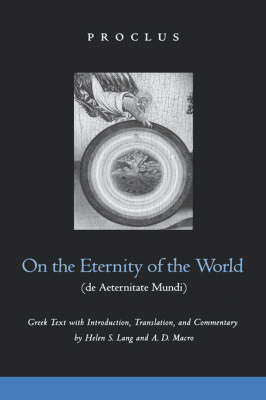
On the Eternity of the World de Aeternitate Mundi
Seiten
2002
University of California Press (Verlag)
978-0-520-22554-1 (ISBN)
University of California Press (Verlag)
978-0-520-22554-1 (ISBN)
- Lieferbar (Termin unbekannt)
- Versandkostenfrei innerhalb Deutschlands
- Auch auf Rechnung
- Verfügbarkeit in der Filiale vor Ort prüfen
- Artikel merken
In the fifth century AD, Proclus served as head of the Academy in Athens that had been founded 900 years earlier by Plato. This bilingual edition comprises Proclus's 17 arguments (II-XVIII) on the eternity of the world and for the existence of God.
In the fifth century A.D., Proclus served as head of the Academy in Athens that had been founded 900 years earlier by Plato. Proclus was the last great systematizer of Greek philosophy, and his work exerted a powerful influence in late antiquity, in the Arab world, and in the Renaissance. His treatise On the Eternity of the World formed the basis for virtually all later arguments for the eternity of the world and for the existence of God; consequently, it lies at the heart of neoplatonic philosophy and the controversy between pagans and Christians at the end of antiquity. Proclus's eighteen Arguments were quoted within John Philoponus' polemic against him, written in the sixth century; but the opening pages of the sole extant manuscript, which contained the first Argument, have been lost. In this book, Helen Lang and A.D. Macro present the seventeen Arguments preserved by Philoponus and translate them as an independent work. The first Argument, which survives in Arabic, is also included and makes this the only complete edition of On the Eternity of the World since antiquity.
This bilingual edition comprises the seventeen Arguments (II-XVIII) in Greek and English, along with an introduction, synopses, and detailed notes which help readers with or without Greek to understand them philosophically and historically. Two appendices complete the volume: the Arabic text of the first Argument, also with English translation and notes, and the first modern edition of an important Latin translation from the Renaissance. In a valuable introduction, Lang and Macro examine the complex history of these Arguments. Together with its excellent annotations, and English and Greek texts en face, the publication of Proclus's On the Eternity of the Worldmakes available an influential work by a major figure in the history of late Greek philosophy.
In the fifth century A.D., Proclus served as head of the Academy in Athens that had been founded 900 years earlier by Plato. Proclus was the last great systematizer of Greek philosophy, and his work exerted a powerful influence in late antiquity, in the Arab world, and in the Renaissance. His treatise On the Eternity of the World formed the basis for virtually all later arguments for the eternity of the world and for the existence of God; consequently, it lies at the heart of neoplatonic philosophy and the controversy between pagans and Christians at the end of antiquity. Proclus's eighteen Arguments were quoted within John Philoponus' polemic against him, written in the sixth century; but the opening pages of the sole extant manuscript, which contained the first Argument, have been lost. In this book, Helen Lang and A.D. Macro present the seventeen Arguments preserved by Philoponus and translate them as an independent work. The first Argument, which survives in Arabic, is also included and makes this the only complete edition of On the Eternity of the World since antiquity.
This bilingual edition comprises the seventeen Arguments (II-XVIII) in Greek and English, along with an introduction, synopses, and detailed notes which help readers with or without Greek to understand them philosophically and historically. Two appendices complete the volume: the Arabic text of the first Argument, also with English translation and notes, and the first modern edition of an important Latin translation from the Renaissance. In a valuable introduction, Lang and Macro examine the complex history of these Arguments. Together with its excellent annotations, and English and Greek texts en face, the publication of Proclus's On the Eternity of the Worldmakes available an influential work by a major figure in the history of late Greek philosophy.
Helen S. Lang is Koeppel Professor of Classical Studies in the Department of Philosophy at Trinity College and author of Aristotle's Physics and Its Medieval Varieties (1992) and The Order of Nature in Aristotle's Physics: Place and The Elements (1998). A. D. Macro is Hobart Professor of Classical Languages in the Department of Classics at Trinity College.
| Erscheint lt. Verlag | 2.1.2002 |
|---|---|
| Einführung | Helen S. Lang, A. D. Macro |
| Übersetzer | Helen S. Lang, A. D. Macro |
| Verlagsort | Berkerley |
| Sprache | englisch |
| Maße | 152 x 229 mm |
| Gewicht | 454 g |
| Themenwelt | Geisteswissenschaften ► Philosophie ► Philosophie Altertum / Antike |
| ISBN-10 | 0-520-22554-6 / 0520225546 |
| ISBN-13 | 978-0-520-22554-1 / 9780520225541 |
| Zustand | Neuware |
| Haben Sie eine Frage zum Produkt? |
Mehr entdecken
aus dem Bereich
aus dem Bereich
mit Sokrates, Seneca, Platon & Co. im Gespräch
Buch | Hardcover (2023)
FinanzBuch Verlag
18,00 €


